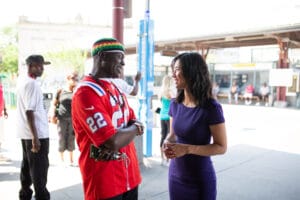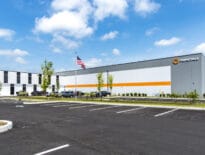
Boston City Councilor Michelle Wu, right, speaks to an MBTA rider at the Nubian Square bus station. Photo courtesy of Michelle Wu
Boston at-large City Councilor Michelle Wu formally launched her campaign for mayor Tuesday morning with a two-minute campaign video that suggests real estate development will feature heavily in her pitch to voters.
“Business as usual has been failing Bostonians since well before the pandemic, and COVID-19 has exposed and exacerbated deep inequities across our city,” Wu said in a statement. “We can build wealth in all our communities, value public education, plan for our neighborhoods, invest in housing we can afford and transportation that serves everyone, truly fund public health for safety and healing, and deliver on a city Green New Deal for clean air and water, healthy homes, and the brightest future for our children.”
Wu’s statement called for “leadership that matches the scale and urgency of our challenges,” a dig at Mayor Marty Walsh, who she has accused of leading from behind on several key issues.
Wu, a Roslindale resident, has been an at-large councilor since 2013. Before that, she was a staffer for former Boston Mayor Tom Menino and Senator Elizabeth Warren, who also taught her at Harvard Law School.
During a press conference Tuesday afternoon, Walsh congratulated Wu on her announcement.
“I want to commend Councilor Wu for her decision. I have great respect for anyone who runs for office and I look forward to our conversations about how to move our city forward,” he said. “But right now we need to get through COVID-19.”
While she is perhaps best known for her advocacy on transportation issues, her announcement highlighted her victories and work in several areas, including:
- Crafting regulations on Airbnb units and other short-term rentals that sought to limit large institutional rentals while preserving homeowners’ ability to rent out their homes.
- Passing reforms to the city’s contracting process that increased racial equity requirements.
- Passing ordinances that created BYOB liquor licenses for small restaurants and streamlined the process for small businesses to host acoustic live entertainment to boost foot traffic.
- Passing a wetlands protection ordinance that boosts requirements for green infrastructure in new developments.
Wu has also been deeply critical of the Boston Planning & Development Agency, saying it has engaged in “no citywide planning” that put residents and developers at odds.
“But the larger problem is that we’re not engaging in thoughtful, long-term community conversations to shape our neighborhoods for a future that includes residents of every demographic and income level. Right now, displacement is treated as a necessary by-product of growth,” she said at the time.
She later issued a white paper calling for the BPDA to be split up, with its planning functions put into a separate planning agency serving a traditional planning board. Those principles later made their way into another white paper her office issued outlining what a Boston-specific Green New Deal would look like.
She has also crossed swords with real estate interests amid efforts to enforce changes to qualifications for city Zoning Board of Appeals members. The City Council had adopted new regulations that require members have qualifications like urban planning and climate change expertise, but the changes still require the state legislature’s endorsement before they are legal.
Updated 2:57 p.m. Sept. 15, 2020: This story has been updated with comment from Boston Mayor Marty Walsh.




 |
| 

